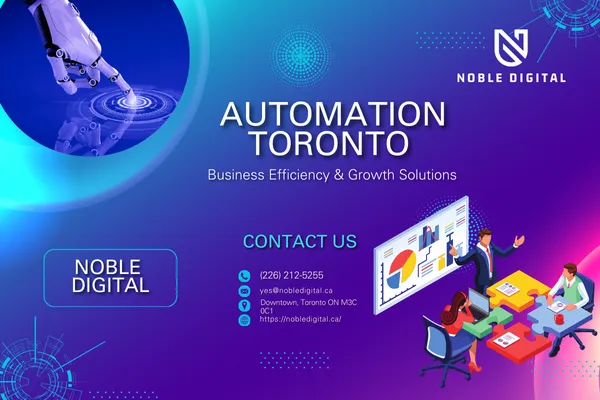
Automation Toronto | Business Efficiency & Growth Solutions
Automation in Toronto: Transforming Business Operations for Maximum Efficiency and Growth
In Toronto's dynamic economic landscape, automation has emerged as a transformative force for businesses seeking competitive advantage, operational excellence, and sustainable growth. As Canada’s largest city and economic hub, Toronto offers unique chances and challenges. Strategic automation is not just helpful, but essential for businesses in this competitive market. This comprehensive guide explores how automation technologies and strategies are revolutionizing operations across Toronto's diverse business sectors.
The Toronto Business Case for Automation
Toronto's status as a global city with a rapidly growing population and thriving business ecosystem creates both tremendous opportunities and significant operational challenges. The city's density, traffic congestion, high operating costs, and competitive talent market make efficiency paramount. Strategic automation addresses these Toronto-specific challenges by streamlining processes, reducing overhead, and enabling businesses to scale effectively despite market pressures.
Companies that embrace automation in Toronto gain significant advantages in customer service responsiveness, operational efficiency, and resource allocation. In a market where consumers expect instant responses and seamless experiences, automation provides the infrastructure to meet these expectations while maintaining profitability.
Key Automation Applications for Toronto Businesses
Customer Experience Automation
In a city where convenience is king, automation enables Toronto businesses to deliver exceptional customer experiences consistently. Intelligent systems can:
Provide instant responses to customer inquiries through AI-powered chatbots
Automate appointment scheduling and reminder systems
Personalize communication based on customer preferences and history
Streamline feedback collection and service follow-ups
These automation solutions ensure Toronto businesses maintain high service standards while efficiently managing customer interactions across multiple channels.
Operational Process Automation
The backbone of successful automation strategies lies in optimizing internal workflows. Toronto businesses benefit from implementing:
Automated inventory management systems that anticipate demand fluctuations
Intelligent scheduling tools that optimize staff allocation across multiple locations
Automated reporting systems that provide real-time business insights
Integration platforms that connect disparate software systems
These operational automation solutions help Toronto businesses reduce errors, save time, and allocate human resources to more strategic, value-added activities.
Marketing and Sales Automation
For Toronto companies focused on growth, automation provides powerful tools for scaling customer acquisition and retention efforts:
Lead nurturing sequences that build relationships with potential customers
Personalized email campaigns triggered by specific customer behaviors
Social media management automation maintaining consistent brand presence
CRM integrations ensuring seamless prospect-to-customer transitions
These marketing automation strategies enable Toronto businesses to maintain consistent engagement with their target audiences while optimizing marketing resource allocation.
Implementation Framework for Automation Success in Toronto
Assessment and Strategic Planning
Successful automation initiatives begin with thorough assessment and planning:
Identify repetitive, time-consuming tasks ripe for automation
Analyze customer journey pain points that automation could resolve
Evaluate current technology infrastructure and integration capabilities
Establish clear objectives and key performance indicators
Technology Selection Criteria
Choosing the right automation tools requires careful consideration of several factors:
Compatibility with existing systems and workflows
Scalability to accommodate Toronto business growth trajectories
Compliance with Canadian data protection regulations
User experience and team adoption considerations
Phased Implementation Approach
Effective automation rollout follows a structured methodology:
Begin with pilot projects demonstrating quick wins and value
Provide comprehensive training and change management support
Conduct thorough testing in Toronto-specific business scenarios
Continuously optimize based on performance metrics and feedback
Toronto-Specific Automation Considerations
Navigating Urban Logistics
Toronto's dense urban environment presents unique automation opportunities in logistics and transportation. Route optimization algorithms can account for the city's complex traffic patterns, construction projects, and seasonal weather challenges, ensuring efficient service delivery across the GTA.
Multilingual and Multicultural Adaptation
As one of the world’s most diverse cities, Toronto supports many languages and cultural needs.
Toronto businesses benefit from automation solutions that meet these needs. AI-powered translation tools and culturally sensitive communication templates enhance customer engagement across Toronto's varied demographic landscape.
Regulatory Compliance Automation
Toronto businesses operating in regulated industries can leverage automation to maintain compliance with municipal, provincial, and federal regulations. Automated monitoring systems can track regulatory changes and ensure business practices remain compliant.
Measuring Automation ROI in the Toronto Context
Successful automation implementation requires clear measurement frameworks. Toronto businesses should track:
Time savings on previously manual processes
Error reduction rates and quality improvements
Customer satisfaction metrics and response time improvements
Revenue growth attributable to automation-enhanced capabilities
Employee satisfaction and engagement levels
Regular ROI assessment ensures automation investments deliver tangible business value and inform future technology decisions.
Future Trends: The Evolution of Automation in Toronto
As artificial intelligence and machine learning technologies advance, automation in Toronto will become increasingly sophisticated. Emerging trends include:
Predictive analytics anticipating Toronto market shifts and consumer trends
Hyper-personalized customer experiences driven by AI-powered automation
Integrated automation ecosystems connecting all business operations
Voice-activated systems adapted to Toronto's multilingual environment
Toronto businesses that stay ahead of these trends will maintain competitive advantages in an increasingly automated business landscape.
Getting Started with Automation: A Practical Guide for Toronto Businesses
For Toronto companies beginning their automation journey, we recommend this approach:
Process Identification: Document 3-5 repetitive tasks consuming disproportionate staff time
Impact Analysis: Prioritize automation opportunities based on potential time savings and error reduction
Solution Research: Identify automation tools addressing your highest-impact opportunities
Pilot Implementation: Launch a small-scale automation project to demonstrate value
Expansion Strategy: Develop a phased plan for scaling automation across operations
Embracing Automation for Toronto Business Success
In Toronto's competitive business environment, automation has transitioned from optional advantage to operational necessity. Companies that strategically implement automation solutions position themselves for sustainable growth, enhanced customer satisfaction, and improved operational efficiency. The thoughtful application of automation technologies enables Toronto businesses to navigate market challenges while seizing growth opportunities in Canada's dynamic economic centre.
The future belongs to Toronto businesses that leverage automation to work smarter, respond faster, and serve better. By embracing these technologies today, forward-thinking companies position themselves to thrive in tomorrow's increasingly automated business landscape.
